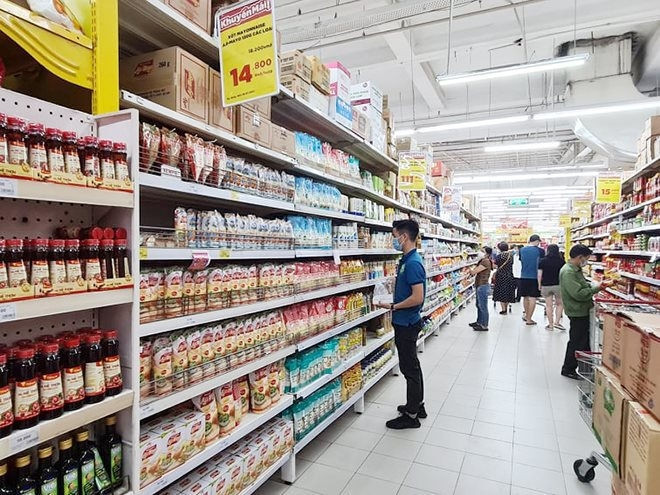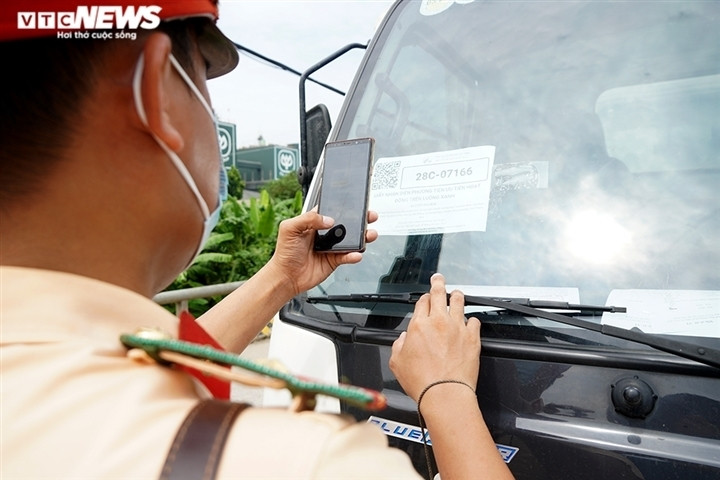Experts say that we must join hands to remove difficulties in the circulation of goods, otherwise not only will people suffer but the economy will also be 'congested'.
Recent reports from localities and businesses show that, in the context of a series of localities applying social distancing measures to prevent COVID-19, the circulation and transportation of goods, especially agricultural products and foodstuffs across the country, is basically smooth.
However, with other goods, circulation is still difficult and problematic due to different understandings of the classification of "essential goods". While people need goods to use but do not have them, manufacturers cannot consume them, some products are stagnant and even have to be dumped or discarded.
Therefore, according to experts, all ministries, sectors and localities need to join hands to untie the bottlenecks of essential goods, remove difficulties in the circulation of goods to both complete the goal of fighting the epidemic, ensure people's lives and promote economic development.
Goods are difficult to circulate, the economy will be blocked
Economics Dr. Bui Trinh acknowledged that there are millions of goods circulating in the economy every day, so issuing a list of "essential goods" during the epidemic is impossible. Even if the list of essential goods is supplemented, it cannot meet all the needs of life. The reason is that during the implementation process, the authorities cannot continuously issue additional documents, because if they list them, they do not know how many are enough.
Therefore, Mr. Trinh agreed with and highly appreciated the recent proposal of the Ministry of Industry and Trade when reporting to the Government to issue a list of "banned goods" instead of regulating the list of "essential goods".
“Except for non-essential goods and restricted goods in the list, all other goods must be circulated to serve the needs of the people, as well as the production goals of enterprises. This is a good policy, more open, more suitable than issuing a list of essential goods,” Mr. Trinh assessed.

The congestion of goods not only makes people suffer but also makes businesses miserable
According to this expert, the list of goods that are not allowed to be transported should be issued as soon as possible and in as much detail as possible. Because the circulation of goods is extremely important, not only for people's lives but also for the economy. Goods cannot be circulated, the supply and demand chain is broken, people do not have goods to use, manufacturers have goods but cannot sell them, the economy will certainly be affected.
Goods are congested, not only will people face difficulties but the economy will also be blocked from growing. - Dr. Bui Trinh
"Therefore, the list of prohibited goods needs to be issued soon, any delay will be more difficult, not only for the lives of people but also for businesses and producers," said Dr. Trinh.
Also agreeing and happy with the proposal of the Ministry of Industry and Trade, Mr. Do Van Bang, Director of Minh Thanh Phat Company Limited, which owns Sao Viet car company, said that if approved by the Government, the transportation of goods will be much more convenient than it is now. Because then only prohibited goods will not be transported, all other goods will be circulated normally.
"So it is only necessary to apply the exclusion rule, prohibited or restricted goods will not be allowed to run, the rest will be allowed to go through the green lane. Transportation businesses like us breathe a sigh of relief," said Mr. Bang.
According to Associate Professor, Dr. Ngo Tri Long, ensuring people's lives in the current dire situation is a very important task. Stabilizing production and relieving pressure on businesses is something that needs to be done immediately. Therefore, we should not distinguish between essential and non-essential goods. We should only stipulate that goods in the prohibited list cannot be transported. This will make it easier for management agencies, avoid congestion of goods, balance supply and demand, and relieve pressure on manufacturers...
However, Mr. Long said that the list of prohibited goods needs detailed regulations and specific instructions to make inspection easier. This will both avoid negative incidents at quarantine checkpoints and help speed up the transportation and circulation of goods.
Essential goods are not just food and drinks
Associate Professor, Dr. Ngo Tri Long said that the authorities are making efforts to control the COVID-19 epidemic. Many strong measures have been applied application, initially recorded positive results. However, with freight transport activities, many places are applying mechanical and rigid regulations, making the circulation of goods difficult, greatly affecting people and manufacturers.

Traffic police only need to use their phones to check the green lane QR code that drivers stick on the windshield to determine the necessary information, without having to check as much as in the past.
The reason is that there are many different understandings of goods, even many localities believe that only food and food are essential. It is the lack of synchronization and consistency in regulations and policies applied in localities that has caused difficulties for goods in circulation.
In addition, localities also apply different policies and regulations on social distancing, controlling goods entering and leaving the locality in a mechanical way, making many items unable to reach consumers.
"People today need a lot of things to ensure their daily lives. Food is an essential commodity, meaning that without it, we cannot survive. But in reality, besides food and drink, people need many other things. These are essential commodities that we must use in our daily lives,” said Mr. Long.
Sharing the same view, according to economist Dr. Bui Trinh, the fact that the authorities previously only generally wrote “essential goods” without clearly listing each item is the main reason why each place understands essential goods differently.
“The use of words is easy to misunderstand, making it difficult for the control agency and confusing for the people, leading to unnecessary controversies such as the “non-essential bread in Nha Trang” incident,” said Mr. Trinh.
The Government directs not to check vehicles carrying goods with QR Codes
Following the Prime Minister's direction in Official Dispatch 1015 dated July 25, to facilitate the transportation of goods in the context of the COVID-19 epidemic, Deputy Prime Minister Le Van Thanh directed epidemic control checkpoints not to check vehicles with valid QR Code identification papers issued by the transport sector to transport goods for construction, production, business, import-export, and consumption (except for goods prohibited from production and business) nationwide.
In case the vehicle does not have a QR Code identification paper or has one but it has expired, the Deputy Prime Minister requested to only check the health declaration and SARS-COV-2 test result certificate for the people on the vehicle.
Checking of cargo vehicles when entering and leaving the gathering, transit, and delivery locations (ports, wharves, stations, warehouses, industrial parks, production facilities, etc.) must ensure full compliance with epidemic prevention requirements and not cause traffic congestion.
However, people on the vehicle must strictly follow the 5K regulations and have a certificate of negative SARS-COV-2 test results within 72 hours from the time of the test results.
In epidemic areas, the People's Committees of provinces and cities must proactively have solutions to divide traffic flows and organize traffic appropriately to minimize the number of vehicles entering urban centers to prevent epidemics, and must ensure smooth transportation, circulation, and distribution of goods through the area.
The Deputy Prime Minister requested leaders of ministries, branches, and provincial People's Committees to focus on leading and directing the implementation of the above content from 0:00 on July 30.
According to VTC News